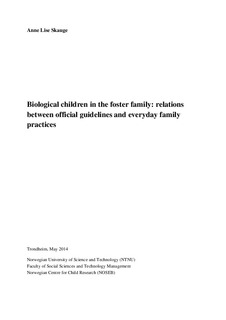| dc.description.abstract | The focus and aim of this study was to illustrate and explore how biological children in foster families experience preparation and follow-up by Bufetat and the Child Welfare Service. Further, I wanted to look at the parents’ role in the process and especially how the children experienced information and preparation by their parents. While exploring the experiences in five foster families it was important to gain a wider understanding of how it was to live in a foster family, how the foster child affected the family dynamic and further which other implications fostering could have.
Based on semi-structured interviews with biological children, foster parents, one informant from Bufetat and one informant from the Child Welfare Service, I got the empirical data to analyse and explore my research questions. I also chose to use family maps as a method with the children to gain a broader understanding of the family relationships.
My main findings is divided into three analysis chapters which seeks to understand the biological children’s point of views of the information, preparation and follow-up, both by the agencies and their parents. Further, I explored the relationships in the family and the families’ experience of the first period after the foster child moved in. Implications in terms of challenging behaviour and how the foster child’s biological family might affect the foster family have been important issues. To get a more nuanced view on the family situation, the parents were included in the study as well, and I found that they had information their children did not reveal.
Children’s voices and the lack of involvement from the Child Welfare Service in terms of the children were important findings and although all the foster families found the process of the placement differently, there were some recurrent issues in most of the families. Not being heard and having little or no contact with the Child Welfare Service, lack of time for preparation and family relationship was expressed as important in most families. | nb_NO |
